Organic grower tackles weeds with cereal/legume intercrop mix
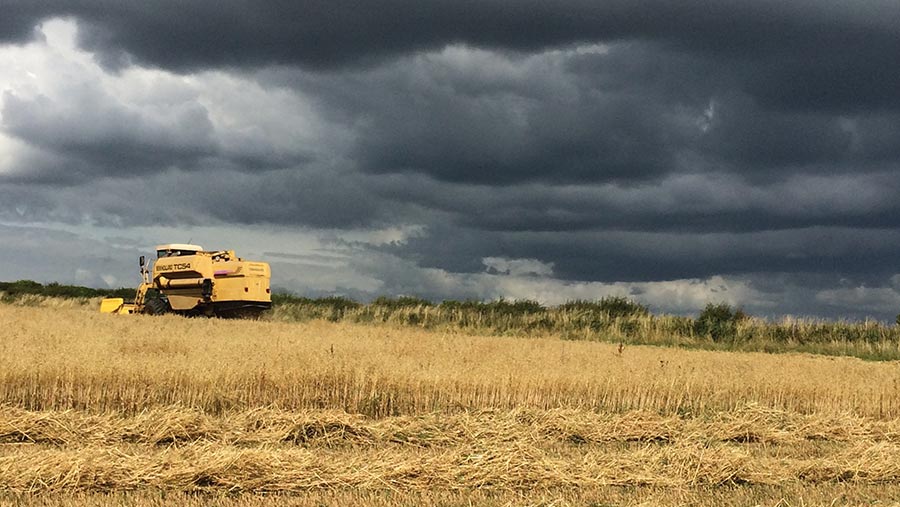 Combing oats at Slade Farm Organics © Polly Davies
Combing oats at Slade Farm Organics © Polly Davies Passionate about organic systems, Polly Davies runs an organic mixed farm in South Wales, basing her arable rotation on fertility-building leys of ryegrass and clover.
She believes farmers have become over-reliant on chemical inputs to solve issues on farm.
“There is definitely scope for chemical cutbacks within conventional arable systems, and there are many lessons to be shared between the two systems.
See also: Video: Mechanical hoes offer solution as herbicide resistance builds
“The more we use chemical actives, the greater the risk of resistance. We therefore cannot carry on the way we have. These actives should be reserved as tools for the future,” she says.
For Polly, legumes play a key role in her arable rotation, fixing essential nitrogen from the atmosphere to fuel crop and soil health, and there is potential for wider benefits from more legumes grown in conventional systems.
Farm facts: Slade Farm Organics
- 300ha tenanted farm on the Glamorgan Heritage Coast
- Cropping includes 30ha winter oats, 30ha spring oats, 14ha spring wheat, 14ha wheat and beans and 2ha Hen Gymro heritage wheat
- 400 Romney ewes sheep, 50 suckler cows plus followers, 50 stores and 50 pigs
- Farm shop and butchery open two days a week
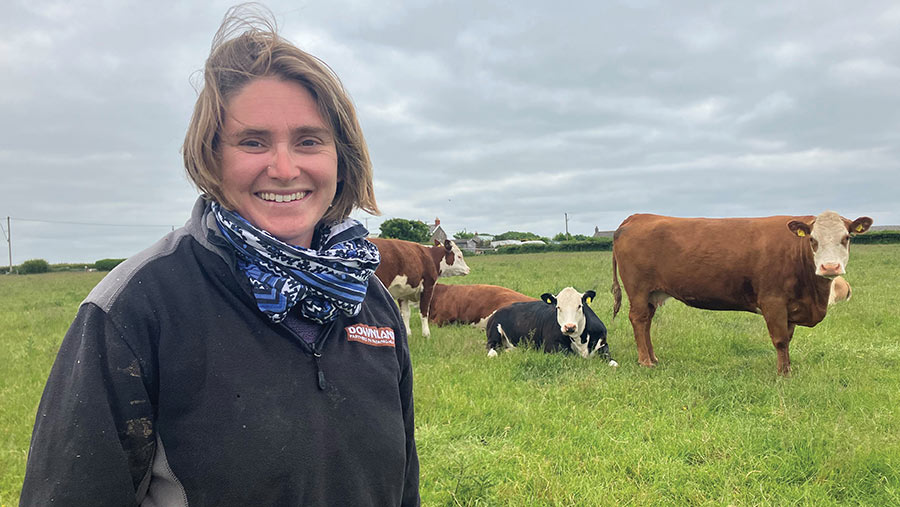
Polly Davies © MAG/Emma Gillbard
The benefits of legumes
This is why she uses a three- to four-year fertility-building ley of ryegrass and clover to fuel arable yields and has incorporated a cereal/legume intercrop mix for weed control at the 300ha tenanted farm on the Glamorgan Heritage Coast.
Each year, 90ha of organic cereals consisting of winter and spring oats, spring wheat and cereal/pulse bicrops are grown at Slade Farm Organics.
Polly also runs a flock of 400 Romney ewes, a herd of 50 suckler cows plus followers, 50 store cattle and 50 pigs.
Rather than buying forage or concentrates to feed the livestock, a home-grown ration comprising wheat, beans and oats is fed. The farm also grows oats for the human consumption market and wheat for milling.
However, Polly says spring beans can be a tricky crop to establish, as it can lead to increased weed pressure.
To mitigate the risk of poor establishment, beans are now grown with a spring wheat intercrop, which acts as a weed suppressant.
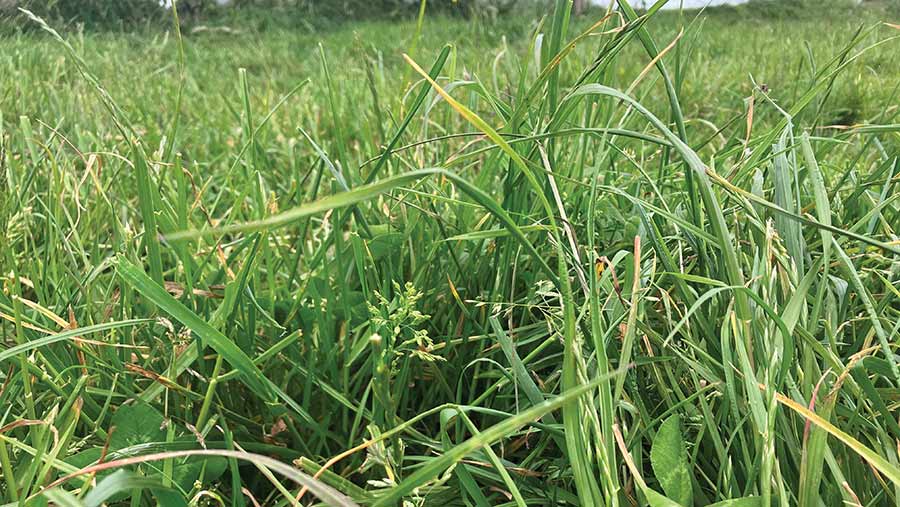
Grass, red and white clover © MAG/Emma Gillbard
“Spring beans like it dry at sowing, followed by a splash of rain, but this year was the complete opposite.
When you intercrop, if the beans struggle, the wheat is able to outcompete any weeds and increase ground cover,” she says.
This simple yet effective tweak has enabled Polly to continue to grow a high-quality protein source for her stock, while reaping the benefits of pulses in the arable rotation, without herbicide use.
The bicrop is then fed to livestock and processed in a mobile mill-and-mix which visits the farm. Spring oats are also added to form a complete diet, which means no bought-in concentrate is required.
Polly says the beauty of a mixed farm is the circular economy of nutrients in the form of manure.
Muck is composted for about 12 months by simply turning the manure pile with a telehandler bucket and ensuring the temperature reaches at least 65C to denature any weed seeds.
Composted manure is then applied ahead of drilling.
Plough power
Winter oats destined for human consumption are the farm’s main cash crop and the first crop to be planted after the three- to four-year fertility ley.
The variety Elyann is grown, performing well on the farm’s clay loam soils and consistently hits milling spec with good kernel size.
Oats are sold to Whites in Northern Ireland for porridge, where Polly is proud to have won the miller’s best oat crop of the year award last season.
Before ploughing and planting the oat crop, the grass and clover leys are tightly grazed by livestock.
Like most organic systems, the plough is an integral part of crop establishment, burying potential weed seeds and turning grass pasture into arable land.
With a zero-glyphosate policy, Polly questions the true sustainability of min-till establishment, which is heavily reliant on chemical products.
Improving yields is one of Polly’s main aims and she hopes that cutting back from three/four years’ worth of cereals in the rotation to two/three will optimise use of the fertility-building phase.
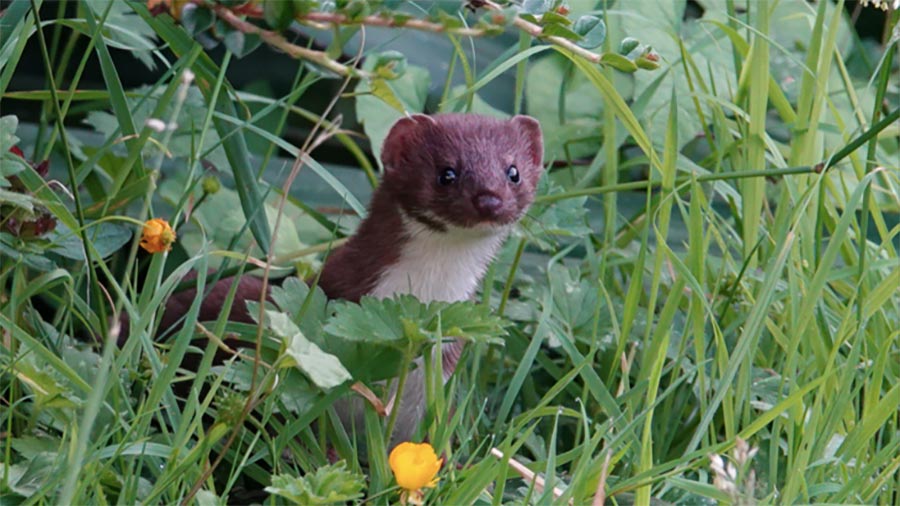
© Paul Roberts
A selected proportion of spring oats are also sold to Whites for human consumption.
“The oats are run through a seed cleaning unit, to remove weed seed contaminants. It selects for grain larger than 2.2mm, which is sold to the mill. What’s left is fed to the livestock.
“We’ve been doing this for the past seven years and it has considerably cut back on energy costs as we are no longer unnecessarily drying weed seeds, which contain more moisture,” she says.
Farm-saved seed is kept across the farm to reduce input costs and reap the benefits of selecting seed genetics tailored to the farm’s coastal environment.
However, this excludes spring beans, which Polly purchases from companies north of Berwick-upon-Tweed to avoid the effects of bruchid beetle damage, as pest pressure is lower in this part of the UK.
Polly also talks of the wildlife benefits that mixed farming organic practice brings, with an abundance of birds such as yellowhammers on farm.
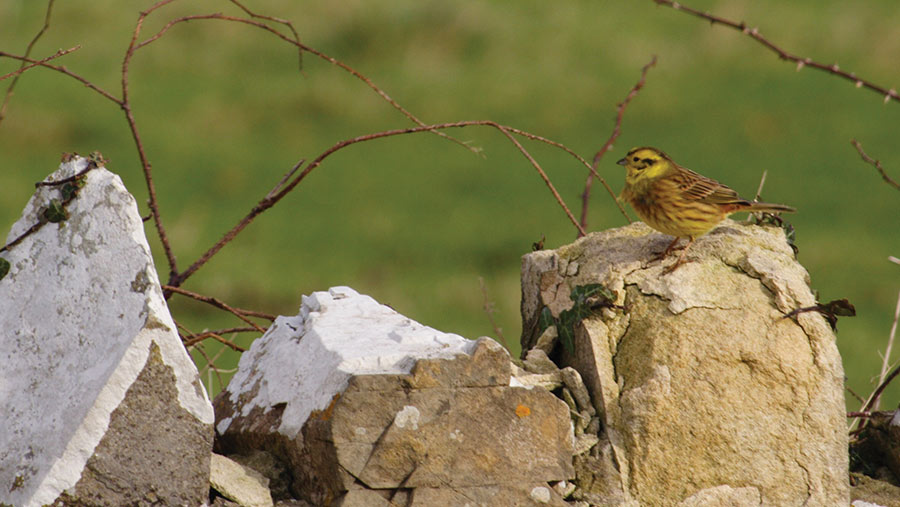
Yellowhammer at Polly Davies Farm © Paul Dunn
Heritage wheat and the on-site farm shop
Polly Davies is now growing 2ha of the heritage wheat Hen Gymro, which is a landrace wheat of south-west Wales, translating as old Welshman. She sells the flour to a local mill, Y Fellin, alongside spring wheats.
With a distinctive red pigment, the heritage crop is one of the few surviving forms of wheat with hairy chaff.
It offers a unique taste, ideal for baking, with good-quality straw that grows up to 128cm in height (compared with modern varieties, which reach about 90cm).
Furthermore, Polly and her husband, Graeme Wilson, run an on-farm butchery and shop. Flour is bought back and sold in the shop alongside meat from animals born and raised on the farm.
The shop is open just two days a week (Thursdays and Saturdays) and markets 100% of the farm’s pork, 30% of lamb and 20% of beef.
Polly says: “As the pigs are fed the home-grown protein mix, they finish slower, but this delivers a better taste.”
Each month, Polly and the team deliver meat boxes around the Vale of Glamorgan and Cardiff, alongside seasonal vegetable boxed for six months of the year.
Worldwide Opportunities on Organic Farms volunteer scheme
Polly Davies and her husband, Graeme Wilson, are involved with the Worldwide Opportunities on Organic Farms initiative.
This global scheme links volunteers with organic farmers to promote knowledge exchange that supports sustainable farming practices.
Volunteers participate in the daily duties of the host farm, learn about sustainability, experience new cultures and meet new people in exchange for free room and board.
“We’ve only been in the scheme six months and we’ve hosted people from Germany, France, Ireland, Japan and England. They help out on the farm from anywhere between one to five weeks.
“They’ve helped lambing, weighing stock or assisting with our seasonal vegetable enterprise. We’ve met a range of people from all over the world – it’s been really lovely,” Polly says.

